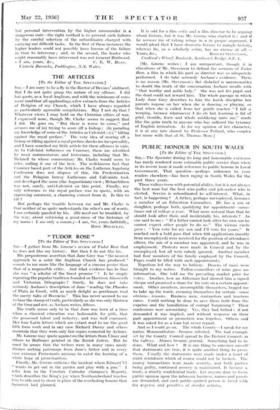" TUDOR ROSE "
[To the Editor of T►CE SPECTATOR.] Sin—I gather from Mr. Greene's review of Tudor Rose that he does not like my history. But then I do not like his.
His preposterous assertion that Jane Grey was "the nearest approach to a saint the Anglican Church has produced," sounds to me more like the language of a cinema poster than that of a responsible critic. And what evidence has he that she was " a scholar of the finest promise " ? Is he simply repeating the popular tradition founded on IIarrimm Ainsworth and Victorian lithographs ? Surely, he does not take seriously Ascham's description of Jane "reading the Phaerlou of Plato in Greek, with as much delight as gentlemen read the merry tales of Boccacio." This has never seemed to me to bear the stamp of truth, particularly as she was only thirteen at the time and not, as Asclunn writes, fifteen.
The truth seems only to be that Jane was born at a time when a classical education was fashionable for girls, that she possessed talent and industry, and was well crammed. Her four Latin letters which are extant read to me like good fifth form work and in any case Richard Davey and others maintain that they were only fair copies corrected by Aylmer.
Mr. Greene may quote against methe letters from Ulmer and others to Ballinger printed in the Zurich Letters. But he must be aware that the writers were in many cases needy divines seeking patronage from Jane's father and in every case extreme Protestants anxious to extol the learning of a white hope of protestantism.
Finally, Mr. Greene criticises the incident where Edward VI " wants to get out in the garden and play with a gun." I refer him to the Venetian Calendar (Soranzo's Report), which describes the King's joy when Northumberland teaches him to ride and to shoot in place of the everlasting lessons that Somerset had planned. It is odd for a film critic and a film director to be arguing about history, but it was Mr. Greene who started it : and it he accuses me of taking refuge in a to quoque argument, I would plead that I have dramatic licence to mangle history, whereas he, as a scholarly critic, has no excuse at all.— lours, &c., llonEwr SrEvExsox. Cardinal's Wharf, Ba»kside, Southwark Bridge, S.E. 1.
[Mr. Greene writes : I am unrepentant, though it is chivalrous of Mr. Stevenson to defend the scenario of Tudor Rose, a film in which his part as director was so adequately performed. I do take seriously Ascham's evidence. There is no reason (Mr. Stevenson's flat disbelief is unreasonable) to doubt the truth of the conversation Ascham recalls with " that worthy and noble lady." She was not his pupil and the dead could not reward him. The whole passage in which Lady Jane Grey describes to him the harsh discipline her parents impose on her when she is dancing or playing, so that when she is called from her gentle teacher " I fall a
weeping, because whatsoever I do els but tear g is ful of grief, trouble, feare and whole mislikeing unto me," reads like the grim truth to anyone who has suffered the tyranny of English recreation. As for my opinion of her character, it is at any rate shared by Professor Pollard, who couples her name with that of St. Thomas More.'


















































 Previous page
Previous page